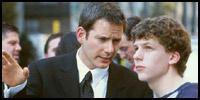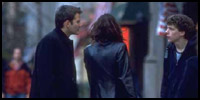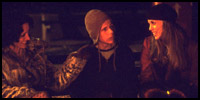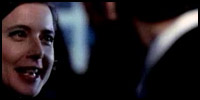
 |
Roger Dodger (2002) Directed by Dylan Kidd Cast: Campbell Scott, Jesse Eisenberg, Elizabeth Berkley, Jennifer Beals, Isabella Rossellini, Mina Badie, Ben Shenkman, Chris Stack 2002 – 104 minutes Rated: Reviewed by Dustin Putman, December 3, 2002.  An incisive character study, "Roger Dodger" marks the auspicious writing-directing debut of Dylan Kidd. A fascinating balancing act between truthful catharsis and human comedy, the film's highlight is definitely its screenplay, both for the rhapsodic dialogue that jumps off the page, and for the memorable character creations.
An incisive character study, "Roger Dodger" marks the auspicious writing-directing debut of Dylan Kidd. A fascinating balancing act between truthful catharsis and human comedy, the film's highlight is definitely its screenplay, both for the rhapsodic dialogue that jumps off the page, and for the memorable character creations.
Manhattan advertising copywriter Roger Swanson (Campbell Scott) is a hard-edged, cynical, self-proclaimed "ladies man" who's pushing 40. He also happens to be a know-it-all who, in the first scene, explains a Darwinistic theory on why rising technology will eventually make men meaningless to female reproduction. And, to top it all off, he is left confused and angered after his slightly older boss, Joyce (Isabella Rossellini), breaks off the fling they have been secretly carrying on.  One day, fate lands in Roger's office in the form of 16-year-old nephew, Nick (Jesse Eisenberg), who claims he is in town for an interview at Columbia. When the inexperienced Nick asks for advice on how to score with women, Roger is more than happy to take him under his wing for a wild night on the town. As drinks are readily consumed, bars are hopped, and women come in and out of the picture, the night turns into something more for Roger, who realizes, to his horror, that maybe he doesn't have as many of the answers as he originally thought.
One day, fate lands in Roger's office in the form of 16-year-old nephew, Nick (Jesse Eisenberg), who claims he is in town for an interview at Columbia. When the inexperienced Nick asks for advice on how to score with women, Roger is more than happy to take him under his wing for a wild night on the town. As drinks are readily consumed, bars are hopped, and women come in and out of the picture, the night turns into something more for Roger, who realizes, to his horror, that maybe he doesn't have as many of the answers as he originally thought.
 "Roger Dodger" will come as a veritable treat to viewers who favor well-flowing, snappy dialogue and intelligent character development over explosions and car chases. Writer-director Dylan Kidd has a sharp ear for the way people really speak, and then digs deeper to show how they feel. This is never more true than for the title character who, as a child, adopted the nickname, "Roger Dodger," because he was always able to work his way out of a jam. Roger instructs Nick on how to talk and look at women as if he were a Lothario godsend, but as the film progresses, Kidd sneakily suggests that he may not be quite the successful womanizer that he brags he is.
"Roger Dodger" will come as a veritable treat to viewers who favor well-flowing, snappy dialogue and intelligent character development over explosions and car chases. Writer-director Dylan Kidd has a sharp ear for the way people really speak, and then digs deeper to show how they feel. This is never more true than for the title character who, as a child, adopted the nickname, "Roger Dodger," because he was always able to work his way out of a jam. Roger instructs Nick on how to talk and look at women as if he were a Lothario godsend, but as the film progresses, Kidd sneakily suggests that he may not be quite the successful womanizer that he brags he is.
 In a career-best performance, Campbell Scott (1998's "The Spanish Prisoner") is terrific as Roger, an outwardly smarmy, self-assured man who is hiding feelings of loneliness and neglect just beneath the surface. Roger isn't always the most pleasant man to be around, but he isn't necessarily bad as much as he is simply absorbed with his own macho ego. As the unsure, but charming Nick, Jesse Eisenberg (2002's "The Emperor's Club" and the older brother of Hallie Kate Eisenberg) is just as good, expressing a wide-eyed innocence as he is exposed for the first time to sexual conversations between adults, alcohol, and even a sad trip to a brothel.
In a career-best performance, Campbell Scott (1998's "The Spanish Prisoner") is terrific as Roger, an outwardly smarmy, self-assured man who is hiding feelings of loneliness and neglect just beneath the surface. Roger isn't always the most pleasant man to be around, but he isn't necessarily bad as much as he is simply absorbed with his own macho ego. As the unsure, but charming Nick, Jesse Eisenberg (2002's "The Emperor's Club" and the older brother of Hallie Kate Eisenberg) is just as good, expressing a wide-eyed innocence as he is exposed for the first time to sexual conversations between adults, alcohol, and even a sad trip to a brothel.
 One of the most intriguing aspects of "Roger Dodger" is the way the female characters are so accurately handled, dismantling Roger's confident view of women every step of the way. Early in their evening together, Roger and Nick meet two beautiful women, Andrea (Elizabeth Berkley) and Sophie (Jennifer Beals), who are as attracted to Nick's purity as they are repulsed by Roger's arrogance. Elizabeth Berkley (2001's "The Curse of the Jade Scorpion") has come a long way since 1995's reviled "Showgirls." She is luminous here, as is the underrated Jennifer Beals (2001's "The Anniversary Party"), in the kind of thoughtful, sparklingly written supporting roles that make you sit up and take notice.
One of the most intriguing aspects of "Roger Dodger" is the way the female characters are so accurately handled, dismantling Roger's confident view of women every step of the way. Early in their evening together, Roger and Nick meet two beautiful women, Andrea (Elizabeth Berkley) and Sophie (Jennifer Beals), who are as attracted to Nick's purity as they are repulsed by Roger's arrogance. Elizabeth Berkley (2001's "The Curse of the Jade Scorpion") has come a long way since 1995's reviled "Showgirls." She is luminous here, as is the underrated Jennifer Beals (2001's "The Anniversary Party"), in the kind of thoughtful, sparklingly written supporting roles that make you sit up and take notice.
 There are a few rough spots in "Roger Dodger," particularly in the final ten minutes when Kidd is unsure of how to rap the story up. At the same time, the journey of self-discovery that both Roger and Nick go on is indelibly felt without feeling the need to spell things out for the viewer or go over-the-top. The exquisitely realized characters on display throughout, and the entertaining things they say, make "Roger Dodger" an above-average independent film that is worth a look. Even if it isn't particularly original or innovative in the movements of its plot, it has an enormously big heart, and a mind to go along with it, too.
There are a few rough spots in "Roger Dodger," particularly in the final ten minutes when Kidd is unsure of how to rap the story up. At the same time, the journey of self-discovery that both Roger and Nick go on is indelibly felt without feeling the need to spell things out for the viewer or go over-the-top. The exquisitely realized characters on display throughout, and the entertaining things they say, make "Roger Dodger" an above-average independent film that is worth a look. Even if it isn't particularly original or innovative in the movements of its plot, it has an enormously big heart, and a mind to go along with it, too.
©2002 by Dustin Putman |
 |













